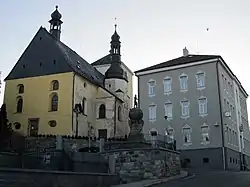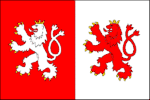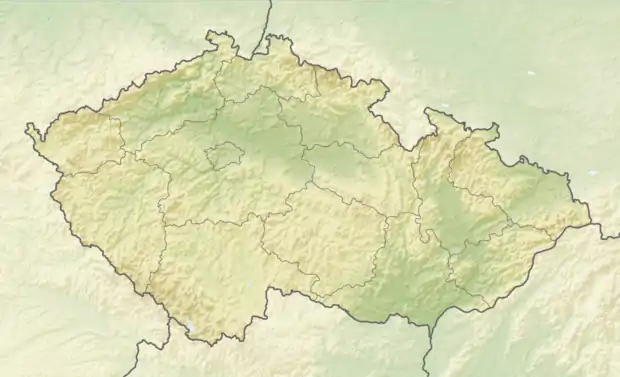Luby (Cheb District)
Luby (German: Schönbach) is a town in Cheb District in the Karlovy Vary Region of the Czech Republic. It has about 2,100 inhabitants. It is well known for its violin-making industry, and was once dubbed the "Austrian Cremona" when Bohemia was part of Austria-Hungary.
Luby | |
|---|---|
 Church of Saint Andrew and town hall | |
 Flag  Coat of arms | |
 Luby Location in the Czech Republic | |
| Coordinates: 50°15′9″N 12°24′22″E | |
| Country | |
| Region | Karlovy Vary |
| District | Cheb |
| Founded | 12th century |
| Government | |
| • Mayor | Vladimír Vorm |
| Area | |
| • Total | 30.69 km2 (11.85 sq mi) |
| Elevation | 518 m (1,699 ft) |
| Population (2021-01-01)[1] | |
| • Total | 2,124 |
| • Density | 69/km2 (180/sq mi) |
| Time zone | UTC+1 (CET) |
| • Summer (DST) | UTC+2 (CEST) |
| Postal code | 351 37 |
| Website | www |
Administrative parts
Villages of Dolní Luby, Horní Luby and Opatov are administrative parts of Luby.
History
During the Middle Ages, Schönbach served as the community centre for the area countryside, and was referred to as Schönbacher Ländchens ("Beautiful Little Country Brook"). During the mid-13th century in Upper Schönbach (Horní Luby), mercury ore, particularly the vermilion variety, was mined in the area. In the 16th century, the ore was regarded as the most important in Central Europe. In 1536, about 200 miners had produced about 13.5 tons of cinnabar from several area mines.
During the Thirty Years' War, the mining came to a complete standstill. In the latter half of the 17th century, Schönbach flourished as a center of violin making.
In 1867–1918, Schönbach was part of the Austro-Hungarian Empire. The village was located within the boundaries of the Eger District created by the Austria-Hungary monarchy. In 1900, Schönbach gained access to electricity and the railroad, which allowed the city to ramp-up production of goods, including musical instruments.
The Austro-Hungarian Empire collapsed in 1918, after World War I, and Schönbach became part of Czechoslovakia. In 1929, about 1,500 Schönbach craftsmen were employed making string instruments. In 1938, following the Great Depression, Germany annexed the western region of Czechoslovakia and administered in as Reichsgau Sudetenland, and occupied it until the end of World War II.
In 1946, right after World War II, Czechoslovakia restored the pre-1938 border and changed the German name Schönbach to the Czech name Luby. In 1949, residents with German ethnicity were expelled from Czechoslovakia. About two-thirds of the Luby population were German, among which, about 1,600 were instrument makers. The instrument makers mostly settled in Bubenreuth of Erlangen, which, before then, only had about 500 residents. Bubenreuth was, at that time, in the American zone of occupied Germany, and therefore was within West Germany afterwards.
History
There were several notable luthiers and music instrument companies in Luby, including:[2]
- Hoyer guitars
- John Juzek
- Violin Making School in Schönbach
- Framus
- Höfner, founded 1887 in Luby
- Strunal CZ a.s.
- Cremona (1948–1992), absorbed by CSHN in 1965
- Československé hudební nástroje (CSHN; 1948–1992)
In 1948, when the communist party took power in Czechoslovakia, the production of music instruments was nationalized and unified into a single Luby-based company called Cremona that had been in existence since 1920. All manufactures and small workshops were part of this company. In 1992, Cremona was privatized and renamed "Strunal," which since as exported under the label of Josef Jan Dvořák (for bowed instruments) and Strunal or Amada (for guitars). Strunal, in its corporate literature, purports to be the largest manufacturer of stringed musical instruments in Europe. The name Strunal is derived from the Czech spelling of "String" ("Struna") and "Luby."
Notable people
- John Juzek (1892 – c. 1965), exporter of orchestral string instruments; worked and died here
- Herta Huber (born 1926), German writer and poet
Gallery
 Centre of Luby
Centre of Luby Town hall
Town hall Music school
Music school
References
- "Population of Municipalities – 1 January 2021". Czech Statistical Office. 2021-04-30.
- Heimatbuch der Musikstadt Schönbach (Music City Schönbach), edited by the Festival Committee for the 650-Year Celebration of Schöenbach, published in Bubenreuth (1969) OCLC 615201359
- "Partnerské město Erlbach" (in Czech). Město Luby. Retrieved 2020-07-23.